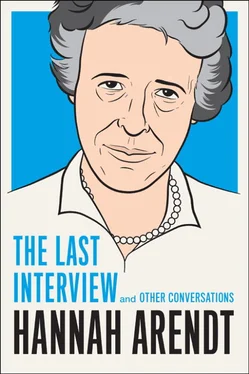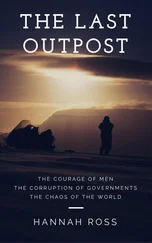ebook: 978-1-61219-033-4
DAVID FOSTER WALLACE: THE LAST INTERVIEW

“I don’t know what you’re thinking or what it’s like inside you and you don’t know what it’s like inside me. In fiction… we can leap over that wall itself in a certain way.”
$15.95 / $15.95 CAN
978-1-61219-206-2
ebook: 978-1-61219-207-9
JORGE LUIS BORGES: THE LAST INTERVIEW

“Believe me: the benefits of blindness have been greatly exaggerated. If I could see, I would never leave the house, I’d stay indoors reading the many books that surround me.”
translated by KIT MAUDE
$15.95 / $15.95 CAN
978-1-61219-204-8
ebook: 978-1-61219-205-5
HANNAH ARENDT: THE LAST INTERVIEW

“There are no dangerous thoughts for the simple reason that thinking itself is such a dangerous enterprise.”
$15.95 / $15.95 CAN
978-1-61219-311-3
ebook: 978-1-61219-312-0
Copyright © 2013 by Melville House Publishing
“What Remains? The Language Remains” © 2013 by The Literary Trust of Hannah Arendt Bluecher. First published in Was bleibt? Es bleibt die Muttersprache , Deutscher Taschenbuch Verlag, Munich, 1965. Translation by Joan Stambaugh © 1994 by The Literary Trust of Hannah Arendt Bluecher.
“Eichmann Was Outrageously Stupid” © 2013 by Hannah Arendt Bluecher Literary Trust, for Arendt’s responses only. Joachim Fest’s questions © 2011 by Piper Verlag GmbH, Munich. First published in Eichmann war von empörender Dummheit. Gespräche und Briefe , ed. Ursula Ludz and Thomas Wild, Munich, Piper, 2011, pages 36–60. Translation copyright © 2013 by Andrew Brown.
“Thoughts on Politics and Revolution: A Commentary” from Crises of the Republic , Harcourt Brace Jovanovich, 1972. Copyright © 1972, 1971, 1970, 1969 by Hannah Arendt and renewed 1999, 1998, 1997 by Lotte Kohler.
“The Last Interview” © 2013 by The Literary Trust of Hannah Arendt Bluecher. First published in the Hannah Arendt Newsletter , #2, December 1999, pages 52–61. Translation copyright for Roger Errera’s questions © 2013 by Andrew Brown.
First Melville House printing: December 2013
Melville House Publishing 8 Blackstock Mews
145 Plymouth Street and Islington
Brooklyn, NY 11201 London N4 2BT
mhpbooks.com www.facebook.com/mhpbooks @melvillehouse
Library of Congress Cataloging-in-Publication Data
Arendt, Hannah, 1906–1975.
Hannah Arendt : the last interview and other conversations / Hannah Arendt.
pages cm
ISBN 978-1-61219-311-3 (pbk.)
ISBN 978-1-61219-312-0 (ebk)
1. Arendt, Hannah, 1906–1975—Interviews. 2. Arendt, Hannah 1906–1975—Political and social views. 3. Political science—Philosophy. I. Title.
JC251.A74A5 2013
320.5092—dc23
2013037680
v3.1
The ellipses here and elsewhere are in the original; they do not indicate omission of material.
Gershom Scholem (1897–1982), German-born Zionist, historian, and eminent scholar of Jewish mysticism, was an old acquaintance of Hannah Arendt’s. On June 23, 1963, he wrote a highly critical letter to her about her book Eichmann in Jerusalem ; see “ Eichmann in Jerusalem : An Exchange of Letters,” Encounter 22 (1964). The quotation given here is from Arendt’s reply, dated July 24, 1963.
Sozialistische Monatshefte ( Socialist Monthly ) was a well-known German journal of the time.
Karl Jaspers’s Psychologie der Weltanschauungen was first published in Berlin in 1919.
Gleichschaltung , or political co-ordination, refers to the widespread giving in, at the outset of the Nazi era, to the changed political climate in order either to secure one’s position or to get employment. In addition, it describes the Nazi policy of converting traditional organizations—youth groups and all sorts of clubs and associations—into specifically Nazi organizations.
Except for the last two chapters, which were written sometime between 1933 and 1936 in France. Rahel Varnhagen: The Life of a Jewish Woman , rev. ed. (New York: Harcourt Brace Jovanovich, 1974), xiii.
Arendt to Scholem, July 24, 1963.
Arendt’s address on accepting the Lessing Prize of the Free City of Hamburg is reprinted as “On Humanity in Dark Times: Thoughts About Lessing,” in Men in Dark Times (New York: Harcourt, Brace & World, 1968).
Arendt plays with the old Latin adage Fiat iustitia, et periat mundus (Let justice be done, though the world may perish). See also Between Past and Future (New York: Viking Press, 1968), 228.
From Schiller’s Das Siegesfest.
By “common sense” ( Gemeinsinn ), Arendt does not mean the unreflective prudence that every sane adult exercises continuously ( gesunder Menschenverstand ), but, rather, as Kant put it, “a sense common to all … a faculty of judgment which, in its reflection, takes account… of the mode of representation of all other men,” Immanuel Kant, Critique of Judgment , §40, cited in Arendt’s Lectures on Kant’s Political Philosophy , ed. R. Beiner (Chicago: University of Chicago Press, 1982), 70–72.
“Karl Jaspers: A Laudatio,” in Men in Dark Times , 73–74.
Fest is referring here to a series of trials that ran from December 20, 1963, to August 19, 1965, in which a number of mid- and lower-level officials in the Auschwitz-Birkenau camp complex were tried for their crimes. The trials were notable for being largely open to the public, and they made many German citizens aware for the first time of the details and mechanisms of the Holocaust.
Jewish councils, the administrative bodies of Jewish communities.
Strahlungen (Radiation) was the title of Ernst Jünger’s collected diaries from the Second World War, first published in 1949.
Rudolf Höß, commandant of Auschwitz from mid-May 1940 through November 1943.
In Kant’s moral philosophy, the concepts of inclination and duty are always opposed.
Wilhelm Boger, a police commissioner and concentration camp overseer, was infamous for his brutality while serving in the political department at Auschwitz. He was tried in the Frankfurt Auschwitz trials of 1965 and sentenced to life imprisonment.
The word Arendt uses for “leader” is Führer.
Hans Frank, the chief jurist of Nazi Germany and governor general of the “General Government” territory, which encompassed much of central and southern Poland as well as western Ukraine, during the war. He was tried at Nuremberg for war crimes and crimes against humanity, found guilty, and executed in 1946.
Читать дальше















